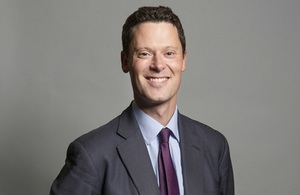Coal power should be consigned to history to keep to 1.5 degrees
Greetings to you all.
It is a pleasure to join you today, and thank you to the Danish Government, IRENA, UNEP and WEF and all other partners involved in organising Energy Action Day.
The subject of this panel event, the coal to clean power transition, is absolutely vital.
Because, we want to avoid the worst effects of climate change, we must consign coal power to history.
There’s really no question about it.
When the countries of the world signed the Paris Agreement in 2015, they committed to limit the rise in global temperature to well below two degrees, aiming for 1.5 degrees.
Because the science shows that this will prevent the most severe impacts.
But that 1.5 degree limit will slip out of reach unless we act immediately.
That was the clear message from the IPCC in August, in their report on the latest climate science.
To keep 1.5 alive we must halve global emissions by 2030.
So the time for talking is behind us. We need urgent action now.
And particularly on power, which accounts for a quarter of global emissions.
Decarbonising our power systems is eminently achievable given the plummeting price of renewables and the stranded asset risk coal presents as a result.
So accelerating the clean energy transition is an absolute focus of the UK’s COP26 Presidency.
And we are seeing progress.
The Climate Vulnerable Forum has recently released a statement supporting no new coal power.
And countries like Pakistan have committed to put an end to new coal power.
I look forward to hearing from Minister Aslam in this session about Pakistan’s clean energy transition, and how international partners can support it.
Here in the UK, coal is down to less than 2 percent of our energy mix and we plan to phase it out entirely by the end of 2024.
And under our Presidency of the G7, the entire group has committed to move to overwhelmingly decarbonised power systems in the 2030s, and to stop financing coal internationally.
South Korea will end international coal finance too, meaning two of the three largest funders in the world will no longer be putting their money into coal.
To support the clean energy transition around the world, our COP26 Presidency has also been building up international collaboration.
Because we recognise that by working together, we make progress faster.
Last year we launched the COP26 Energy Transition Council, this brings together more than 20 governments, and 15 international institutions, including development banks, to support the green transition in developing countries.
We have also launched the Rapid Response Facility, which is currently responding to over 15 country requests for timely, flexible support with their energy transition.
And we plan to build on these initiatives beyond Glasgow, so that strong partnerships between governments, investors and communities continue to drive the energy revolution.
We urge countries, regions, companies and investors to join the Powering Past Coal Alliance, to accelerate the move away from coal, and the number of national government members has increased 25 percent since COP25.
And we ask financial institutions to move away from coal, and seize the opportunity of investing in clean power alternatives.
To encourage investments in emerging markets we have brought governments, investors and industry together in dialogues, including through the Energy Transition Council, to build investment confidence.
And I am very pleased that public financial institutions are supporting countries with the energy transition.
The “Climate Investments Funds” are an excellent example, and you will hear from their CEO, Mafalda Duarte, today, as well as hearing from Mary Quaney, CEO of Mainstream Renewable Power, a leader in working with local countries and communities to deliver the clean energy transition in new markets.
The progress we have seen is fantastic but there is much further to go ahead of COP26.
Because a gap remains. And it is far too large.
480 gigawatts-worth of new coal power stations are still planned around the world.
So ahead of COP26 and at the summit itself, we need governments to make those strong, clear commitments to end polluting coal generation and prioritise clean power.
We urge countries to put an end to coal power.
By phasing out existing plants, committing not to build any new ones, and putting an end to international coal finance.
We need all investors, acting on our shared responsibility, to protect our planet.
And we need to keep building up the international collaboration, at COP26 and beyond it, to accelerate the clean energy revolution over this vital decade.
Which, frankly, it is no exaggeration to say, will determine the course of our planet’s future.
I hope the UN High-Level Dialogue on Energy next week will see countries announcing ambitious action on energy, including through their Energy Compacts.
And on COP26 Energy Day we will highlight countries’ commitments to scale up clean power, stop new coal and support a just transition.
Because the world needs to see urgent action on power – particularly the global exit from coal – to keep 1.5 degrees alive and ensure access to clean, affordable and reliable energy for all.
And I hope that today, you will have a productive discussion on the practical ways in which we can spur action on energy, supported by international collaboration.
With a panel like this, composed of trailblazers in their respective areas, working together, I am sure that you will.
So let’s keep working together to revolutionise the way we power the world.
Thank you.
